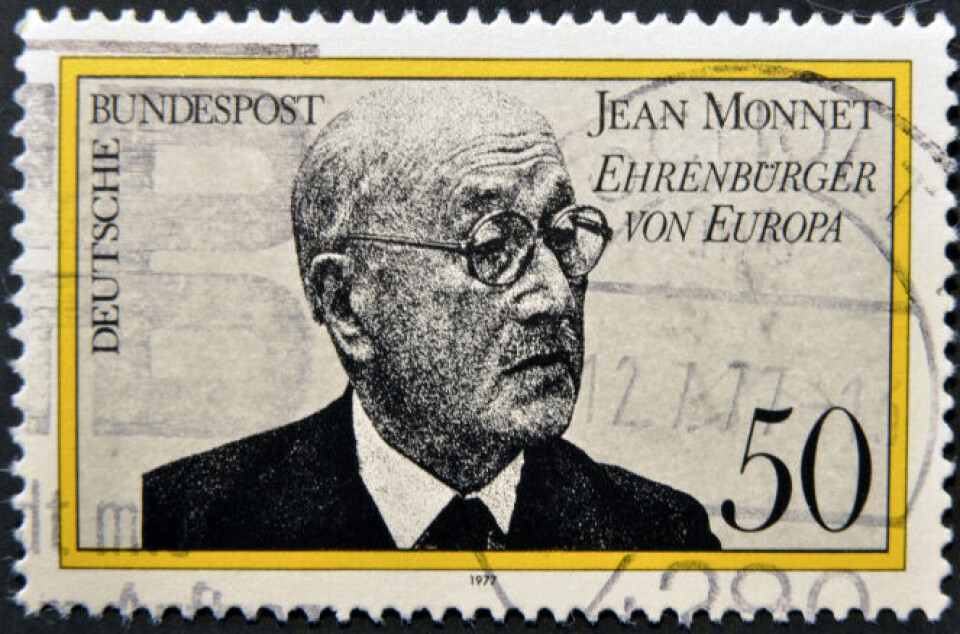-
New Paris-Jersey direct flight to launch this summer
Loganair route forms part of Channel Island’s tourism boost plan
-
Death of right-wing protester in Lyon sparks fears of further political violence
Quentin D, 23, died after reportedly being ambushed by far-left activists near site of political conference
-
Red flood alerts continue in south-west - and more heavy rain expected
Garonne river is particularly affected. French weekly weather forecast February 16 - 20
Who was Jean Monnet and why is the EU celebrating him at the Panthéon?
European commissioners from the 27 EU states are meeting today in Paris with the French and EU Commission presidents to honour Mr Monnet as well as iconic French politician Simone Veil

Jean Monnet and Simone Veil are being honoured today in Paris marking the start of France’s six-month presidency of the EU, but while Mrs Veil may be familiar to many Connexion readers, today we look at the important career of Jean Monnet, who died in 1979.
European Commission President Ursula Von Der Leyen and President Emmanuel Macron met this morning, as part of a visit marking the start of France’s presidency.
They joined commissioners from all of the EU states, paying tribute to Mr Monnet and French stateswoman and feminist Simone Veil, as two key French figures of European unification, in front of the Panthéon today (January 7, 2022).
The visit comes as a new survey* shows French people remain divided on European issues.
Mrs Veil was known for her pioneering work in both EU and French politics, including being the first president of the European Parliament, from 1979-1982, and playing a major role in Franco-German reconciliation and the construction of the EU. In France she is also famous, among other achievements, for her 1975 law legalising abortion.
Fellow French citizen Jean Monnet played an equally important role in the development of the EU and is considered one of its founding fathers.
Who was Jean Monnet?

Jean Monnet, a French businessman, financier, diplomat and civil servant is regarded as having been one of the first to lay the foundations of what would become the EU, in an effort to bring long-lasting peace and prosperity between several European countries. He was never elected to office, but did important work behind the scenes.
Mr Monnet was the first person to be given honorary citizenship of Europe, in 1976, and on the hundredth anniversary of his birth, in 1988 he was honoured by his remains being moved to the Panthéon, the resting place of great men and women of France.
Early days in Cognac trade let to interest in international affairs
Born on November 9, 1888, in Cognac (Charentes), Mr Monnet started work in his family-owned cognac business. As part of his work for the family firm he moved to London aged 18 and also regularly took part in trips abroad for Monnet Cognac, including to the US.
During World War One he became convinced that the UK and France should work more closely together to achieve an Allied victory, coordinating their war resources. A family friend helped him meet the then French Prime Minister to discuss his ideas.
He went on to take part in a commercial agreement between France and the UK to optimize ammunition and raw supplies between Europe and the US.
At the Paris Peace Conference between the Allies at the end of the war, he was assistant to the French minister of commerce and industry, and he was then asked in 1919 to become deputy secretary general of the League of Nations, an international coalition of 58 countries to promote and maintain world peace.
He held the post until 1923, when he left to again help his family business which was endangered in the US because of prohibition. He worked between the countries and later moved to the US to work for a New York bank, becoming involved in international finance.
In September 1939, the French prime minister asked him to go to London to coordinate the organisation of Franco-British war supplies. He went on to work for both the British and American governments, and helped with French reconstruction efforts after the war.
In 1939, he was behind a proposed merger between France and the UK during the war, convincing both Winston Churchill and General De Gaulle before the plan was ditched on June 16, 1940 when France ceded to Germany with Marechal Petain taking command.
A pioneer of closer European union
After the war Mr Monnet conceived the idea of the European Coal and Steel community (CECA), which (from 1951) united Belgium, France, Italy, Luxembourg, the Netherlands and then West Germany under an economic agreement aimed at integrating the markets for commodities seen as essential to war.
It was intended to strengthen Franco-German cooperation and make future wars “not only unthinkable, but materially impossible”.
“A united Europe is indispensable for the security and peace of the free world”, he said in a speech before the National Press club, in Washington on April 30, 1952.
He was then instrumental in working towards closer European economic unity, leading to the signing of the Treaty of Rome in 1957, which created the European Economic Community (EEC), which later became the European Union.
He continued to work on European agreements, leading eventually to the creation of the European single market in 1993.
He also participated in a project to integrate the UK into the EEC, which became effective on January 1, 1973 up until Brexit. He created Jean Monnet’s foundation for Europe in Lausanne in 1978.
He died at home in Houjarray, Yvelines, on March 16, 1979. His funeral was attended by Valerie Giscard d'Estaing and Helmut Schmidt, then French president and German chancellor.
France has since named streets, museums, universities, and several other public spaces throughout the country after him.
Survey shows French euroscepticism
Jean Monnet’s heritage is currently being put to a test, at a time when Europe is dealing with the consequences of Brexit and a clear divide among French people.
Some 27% of French people said Europe provides more advantages than disadvantages while 33% answered the other way around and 39% said neither/nor, according to a poll by French newspaper Les Echos.
French people are also divided on the Euro currency with 50% saying it was a bad decision while 49% thought it had been the right thing to do.
*Poll carried out for Les Echos by advising and polling company Elabe on 1,000 people between January 4 and 5, 2022.
Read more
US-born French icon Josephine Baker to enter France’s Pantheon
























